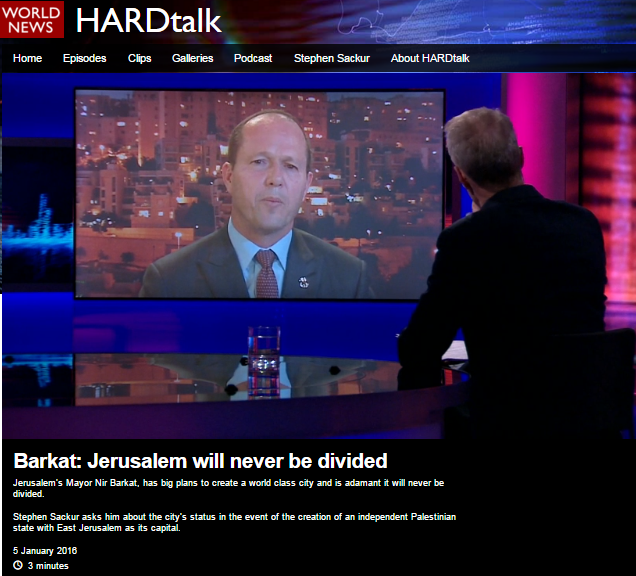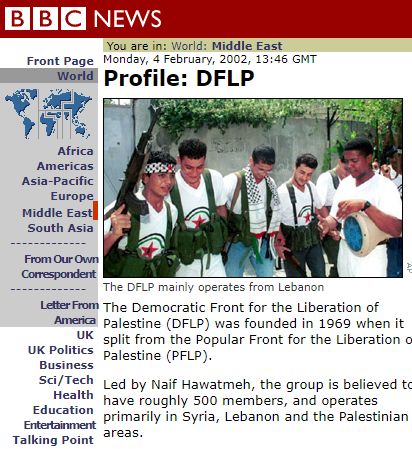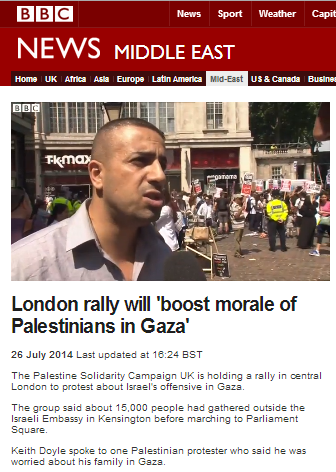Earlier this month the Mayor of Jerusalem, Nir Barkat, was interviewed by Stephen Sackur for ‘Hardtalk‘. The filmed version of the programme (broadcast on BBC World News on January 5th) is available to those in the UK on iPlayer here and can also be found here. The synopsis to the filmed version reads as follows:
“Stephen Sackur talks to Nir Barkat, the mayor of Jerusalem, about his ambitious plans to turn his city into a top global city hosting 10 million tourists a year.”
An audio version of the interview was broadcast on BBC World Service radio on January 6th and the synopsis to that item reads as follows:
“The Mayor of Jerusalem, Nir Barkat, has grand plans to turn Jerusalem into a world city but is his vision far removed from the reality on the ground? He talks to Stephen Sackur about his aspirations.”
In fact listeners and viewers heard nothing about Nir Barkat’s plans to develop tourism in his city – not least because Stephen Sackur spent almost as much time talking as did his interviewee. Just under ten minutes of the airtime of a programme 23 minutes and 51 seconds long (including opening title and closing credits) were taken up by Sackur himself as he repeatedly interrupted Barkat’s answers in order to pursue his own agenda.
As is not at all unusual to see in his ‘Hardtalk’ interviews with Israeli politicians, Sackur ascended his pulpit and proceeded to ensure that what audiences took away was not insight into how the Mayor of Jerusalem plans to develop his city or what special challenges he faces, but politicized preaching on the topic of the Arab-Israeli conflict. The tone was already set in the introduction.
“Israel declares Jerusalem to be its undivided capital but the physical evidence inside the city points to a different reality. Jerusalem is a city of checkpoints, security barriers and constant tension between Jews and Arabs.”
That theme was further promoted by Sackur several times throughout the interview.
“If we as outsiders look at the city today it seems more tense, more full of fear and – frankly – full of division than ever before.”
“It’s a division. It’s a division. It’s a myth this idea of an open undivided Jerusalem.”
“Well as it happens…yeah Mister Mayor…as it happens I know Jerusalem quite well. I’ve lived there for several years myself [1995 to 1997 – Ed.]. It’s changed a lot since I lived there – not least because there are new security barriers, there are new checkpoints in place. This idea that you peddle that Jerusalem is an open and undivided city is patently not true. It is more divided – by armed checkpoints and the security wall and everything else – than it’s ever been before.”
Naturally viewers heard nothing about the nineteen years during which the city really was divided because part of it was under Jordanian occupation. As Nir Barkat pointed out, the vast majority of the checkpoints put in place in late 2015 in order to curb terrorism by attackers from Arab neighbourhoods of Jerusalem have since been removed: obviously Sackur failed to check the facts before employing that subject in his sermon.
Another theme seen in this interview – that of irresponsible, trigger happy Israeli politicians – was also found in a previous one with Yair Lapid.
“You are the very mayor who, in the autumn of last year, advised all Jerusalem…Israeli Jewish Jerusalem residents…to carry a pistol. I mean, what kind of message is that sending?”
“…what do you feel about senior Israeli politicians like Yair Lapid who we had on this programme saying that in his view, if anybody was seen to pull a knife or even a screwdriver – to quote him – don’t hesitate; shoot to kill. Do you think that was the right, responsible message to send?”
“It’s not for you as politicians to inflame emotions and get involved in this sort of way, is it?…”
The perennial theme of Israeli racism was also promoted.
“You said ‘I’m a strong believer in profiling’. ‘Profiling’, you said, ‘helps keep the citizens of Jerusalem safe’. What do you mean by profiling? Who are you profiling?”
“I appreciate that answer but with respect, mister mayor, I don’t think anybody in the outside world really believes that the Shin Bet spends as much time profiling and seeking out Jewish extremists as it does Muslim Arab extremists. So I’m very struck by what Binyamin Netanyahu said just the other day […]. He talked about enclaves. He clearly meant Arab communities – Arab enclaves with – quote – Islamist propaganda, plenty of weapons, constant crime. This wasn’t pointing to individual threats and dangers. He was tainting an entire community. Do you do the same?”
“So do you disown the words of your own prime minister? […] Do you think – in the words of Ha’aretz newspaper – that what he said was very close to outright racism?”
Netanyahu’s words were as follows:
“There are many among Muslim Israeli citizens who have come out against the violence and are crying out for full law enforcement in their towns. At the same time, we all know that there is wild incitement by radical Islam against the State of Israel in the Arab sector. Incitement in mosques, in the education system, on social media,” he said, vowing to continue efforts to stop the incitement.
The prime minister said he is unwilling to have a state within a state in Israel, in which some citizens live in “enclaves with no law enforcement, with Islamist incitement and an abundance of illegal weapons that are often fired at happy events, weddings, and during endless criminal incidents.”
Sackur – who only minutes earlier claimed to “know Jerusalem quite well” – came out with the following inaccurate and materially misleading statement:
“Yeah, you’ve raised one particular grievance, one area of tension, which is access to the holiest of places for Muslims – they call it Haram al Sharif – it’s holy for Jews too; you call it Temple Mount…” [emphasis added]
Politicised messaging continued with repeated portrayal of Arab residents of Jerusalem as “second class citizens” and depiction of Jerusalem neighbourhoods as “settlements”.
“Yeah, but you know what Mister Mayor? What you haven’t mentioned at all are the realities about, for example, housing, planning permits construction. Look at the reality. Even today thousands of new housing units have been sanctioned by your municipality and the Netanyahu government for a whole bunch of Jewish settlements – as the international community still calls them – on occupied land in East Jerusalem. At the very same time we see that 14,000 Palestinians have had their residency revoked since 1967. It’s almost impossible for most Palestinians to get permission to build new housing on empty land in East Jerusalem. The reality of the situation is that, again, they’re second class citizens.”
Sackur is apparently convinced that he knows more than the Mayor of Jerusalem about construction statistics in that city.
“Are you telling me…are you telling me that the UN and others who have looked at the stats and say that more than three times as many housing permits, construction permissions, are given to Jews in East Jerusalem than to Arabs – Muslim Arabs in East Jerusalem – are you telling me that’s just plain wrong?”
Promotion of the PLO talking points put out a while ago by ‘Hardtalk’ frequent flyer Saeb Erekat was also evident.
“…but I spoke not a long time ago to Saeb Erekat […]. He almost cried with frustration when I put it to him that Israelis see ideological reasons behind the incitement – as you put it – of young Palestinian men. He said look don’t they understand that as long as Israel refuses to engage on the question of settlements, on the question of realistic negotiation of a two state solution, these people, the anger, the hate, will continue. Do you not get that?”
“Are you comfortable with the fact that unless you and other Israeli politicians recognize that in the end there has to be a sharing of the sovereignty of Jerusalem for a two state solution to work, if you’re not prepared to accept that then there can never be meaningful peace negotiations, can there? Are you comfortable with the position that you and your city are in?”
Sackur also came out with this gem:
“Prime Ministers Rabin, Peres, Barak, Olmert: all were prepared as realistic, pragmatic politicians to accept that there would have to be some sort of deal with the Palestinians over Jerusalem – some sort of symbolic shared sovereignty and internationalization of the holy places. Why won’t you?”
Leaving aside the fact that there is no evidence to support Sackur’s highly dubious claim that Yitzhak Rabin embraced the idea of “shared sovereignty” of Jerusalem, it is notable that he has obviously failed to ask himself why – if it is indeed the case that four Israeli prime ministers have offered to compromise on the issue of Jerusalem – have the Palestinians not seized any of those opportunities to make a peace deal during the last two decades.
Like so many others who adopt the messianic far-Left approach to the Arab-Israeli conflict whereby if only Israel did this, that or the other, then salvation would be instantly at hand, Sackur strips Palestinians of all agency or responsibility for the ongoing conflict. Hence, whilst able to admonish Barkat for his allegedly ‘unrealistic’ views on the subject of the division of the city, he is also able to ignore the fact that the “realistic, pragmatic” approach he holds up as the gold standard has been repeatedly rejected by the Palestinian side to the dispute. Likewise, that same cognitive dissonance enables Sackur to rebuke Barkat (and by extension, Israel) for the implementation of measures designed to cope with repeated waves of terrorism whilst exonerating those actually carrying out the attacks.
Obviously Stephen Sackur’s aim in this programme was not to provide his audiences with the opportunity to learn more about Jerusalem, the man who runs it or his plans for the city’s development. Instead, yet again, ‘Hardtalk’ audiences simply heard a so-called ‘interview’ with an Israeli public figure which is nothing more than a sermon based on Sackur’s weary – and by now decidedly dog-eared – charge sheet.
Related Articles:
Selective framing, inaccuracies and omission of context on BBC’s Hardtalk
BBC’s Sackur touts ‘racist’ Israel in Hardtalk interview with Herzog
BBC’s Sackur suggests being pro-Israel should be a problem
BBC’s Sackur promotes notion of Israeli settlements as a ‘war crime’




